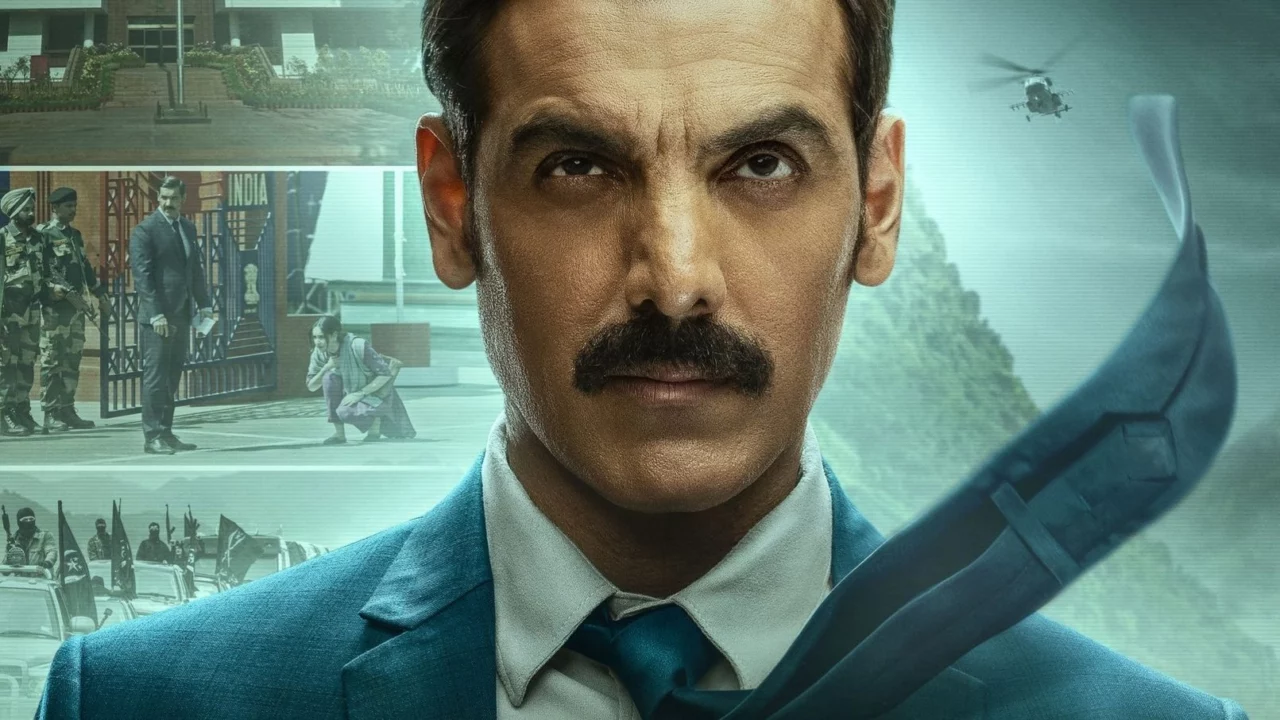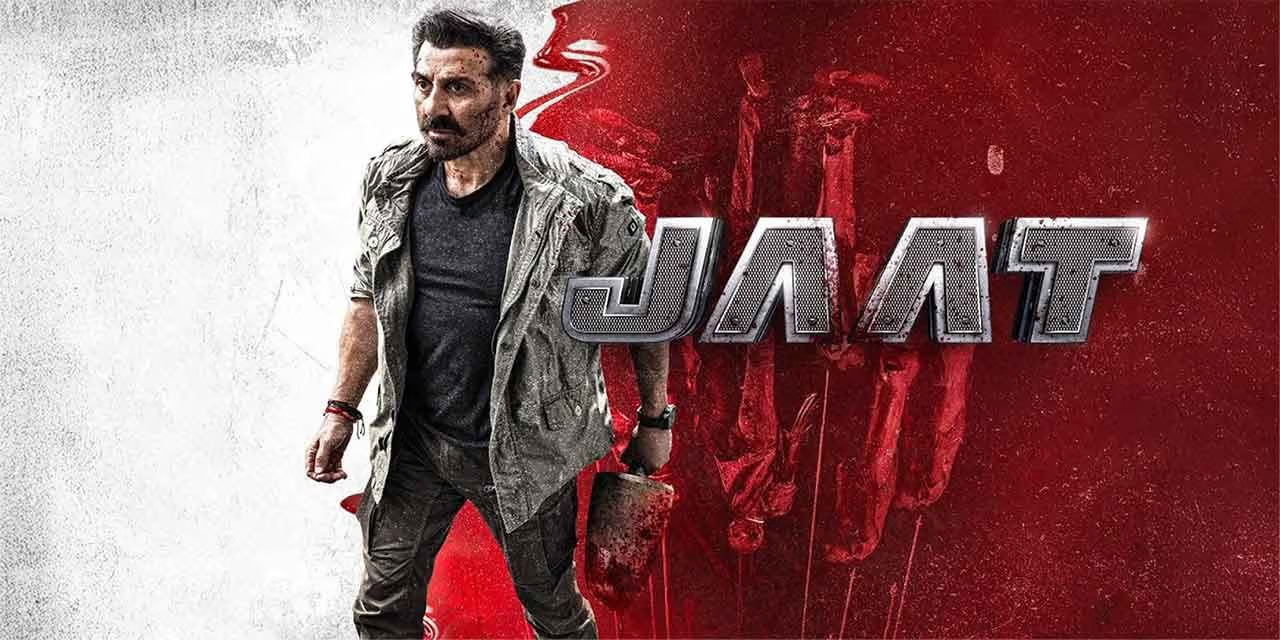‘The Diplomat’ (2025): John Abraham Stars in Gripping True Story of Rescue and Diplomacy – Full Movie Details
Introduction: Unveiling a Tale of Courage and Diplomacy
West Bengal: Released amidst the festive fervor of Holi on March 14, 2025, the Hindi film “The Diplomat” brings a gripping true story of international rescue, diplomatic maneuvering, and personal courage to the silver screen. Starring Bollywood action star John Abraham in the titular role, this political thriller, directed by Shivam Nair and penned by Ritesh Shah, delves into a high-stakes mission set against the complex backdrop of India-Pakistan relations. Inspired by the real-life ordeal of Uzma Ahmed, an Indian woman repatriated from Pakistan in 2017, the film offers a dramatized look into the intense pressures, risks, and intricate processes involved when diplomacy becomes a lifeline. Garnering attention for its taut narrative and John Abraham’s portrayal of a determined Indian diplomat, “The Diplomat” aims to shed light on a lesser-known chapter of bravery within the Indian Foreign Service. This comprehensive article explores the film’s plot, the true story that inspired it, the cast and characters, production details, critical reception, and thematic significance.
(Please note: This article focuses on the 2025 Hindi film starring John Abraham. A popular American political thriller TV series of the same name, starring Keri Russell, also exists on Netflix.)
The True Story: Uzma Ahmed’s Harrowing Ordeal and Repatriation
To fully appreciate the narrative of “The Diplomat,” understanding the real-life events that inspired it is crucial. In 2017, Uzma Ahmed, an Indian citizen from New Delhi, found herself trapped in Pakistan. According to her accounts, she had travelled to Pakistan’s Khyber Pakhtunkhwa province believing she was visiting relatives of a man named Tahir Ali, whom she had met and fallen in love with in Malaysia. Upon arrival, she alleged she was forced at gunpoint to marry him. She further claimed that Tahir Ali was already married and had four children, and that she faced abuse and violence after the forced marriage.
Seeking escape, Uzma managed to reach the Indian High Commission in Islamabad under the pretext of needing to report for visa purposes. Once inside the embassy premises, she sought refuge and requested immediate repatriation to India, detailing her ordeal. This action triggered a complex diplomatic and legal situation. Tahir Ali filed a police complaint alleging his wife was being held captive, while also petitioning the Islamabad High Court for a meeting with her.
The Indian High Commission provided Uzma with shelter and legal assistance. The case garnered significant media attention in both countries. India’s then-External Affairs Minister, the late Sushma Swaraj, took a personal interest in the case, monitoring developments closely and assuring Uzma’s family of her safe return. The Indian mission argued Uzma’s case in the Islamabad High Court, emphasizing her right as an Indian citizen to return home and detailing the coercion and abuse she faced.
After tense legal proceedings and diplomatic negotiations, the Islamabad High Court ruled in Uzma’s favour, granting her permission to return to India. On May 25, 2017, amidst tight security provided by Pakistani authorities up to the Wagah border, Uzma Ahmed crossed back into India, emotionally thanking Sushma Swaraj and the Indian government for saving her life. Her return was hailed as a significant diplomatic success and a testament to the protective role of Indian missions abroad. It is this dramatic sequence of events – the distress call, the refuge, the legal battle, the diplomatic tightrope walk, and the eventual rescue – that forms the core inspiration for the 2025 film “The Diplomat.”
Plot Synopsis: A Race Against Time in Hostile Territory
“The Diplomat” translates Uzma Ahmed’s story into a cinematic political thriller. John Abraham steps into the shoes of J.P. Singh, portrayed as a resolute Deputy High Commissioner (or a similar high-ranking diplomat) stationed at the Indian mission in Islamabad. The narrative kicks off when a distressed woman (played by Sadia Khateeb, representing Uzma) enters the embassy, claiming to be an Indian citizen trapped in Pakistan after being tricked and forced into marriage. She pleads for protection and repatriation.
J.P. Singh and his team initially treat her claims with caution, wary of potential espionage or manipulation given the sensitive diplomatic environment. However, upon verifying her identity and the harrowing details of her abuse and coercion, Singh takes the critical decision to grant her refuge within the embassy compound.
This act immediately escalates tensions. The woman’s Pakistani husband (based on Tahir Ali) launches accusations, claiming she is being held against her will, painting the Indian mission in a negative light internationally. The film depicts the immense pressure on J.P. Singh – navigating Pakistani legal challenges designed to reclaim the woman, managing the media storm, countering misinformation, and ensuring the woman’s safety within the embassy walls, all while dealing with the complex protocols and potential political fallout between India and Pakistan.
The plot unfolds as a race against time, likely incorporating the detail of the woman’s expiring visa, which adds urgency to the repatriation efforts. Singh must use all his diplomatic acumen, leverage back-channel communications, coordinate with New Delhi (potentially featuring Revathy as the External Affairs Minister), and navigate treacherous local dynamics to secure safe passage for the woman back to India. The film portrays the personal risks taken by the diplomat and his team, operating in a potentially hostile environment where one misstep could lead to disaster. It highlights the blend of legal strategy, political negotiation, and sheer human determination required to succeed in such a high-stakes rescue operation.
Cast and Characters: Bringing the Drama to Life
The film relies on a strong ensemble cast to portray the various players in this diplomatic drama:
- John Abraham as J.P. Singh: Known for his action roles and patriotic films (Parmanu, Batla House, Attack), Abraham takes on the role of the central diplomat. His portrayal focuses on the character’s determination, resilience, strategic thinking, and the weight of responsibility in a perilous situation. Reviews suggest he attempts something different, moving beyond pure action to embody the nuances of diplomacy under fire.
- Sadia Khateeb as Uzma Ahmed (Character Name May Differ): Following her debut in Shikara and role in Raksha Bandhan, Khateeb portrays the vulnerable yet strong woman seeking rescue. Her performance is highlighted in reviews as the “soul of the film,” capturing the trauma, fear, and eventual courage of the character.
- Kumud Mishra as Senior Diplomat / Advocate N.M. Sayyed: A versatile character actor, Mishra likely plays a crucial supporting role, perhaps as a senior colleague offering guidance or the legal counsel representing the woman/embassy in Pakistani courts. His presence adds gravitas and experience to the ensemble.
- Sharib Hashmi as Tiwari (Journalist?): Known for his roles in Filmistaan and The Family Man, Hashmi often brings relatability and sometimes intrigue. His character could be a journalist investigating the case or an embassy staff member integral to the operation.
- Revathy as Sushma Swaraj (External Affairs Minister): The veteran actress reportedly portrays the then-External Affairs Minister, showcasing the political leadership and support from New Delhi that was crucial in the real-life case.
- Supporting Cast: Actors like Ashwath Bhatt (possibly as a Pakistani official/antagonist), Amitoj Mann, Benjamin Gilani, Ram Gopal Bajaj, Vidhatri Bandi, and Jagjeet Sandhu (as Tahir, the husband) contribute to the film’s texture, portraying various officials, family members, and legal figures involved in the conflict.
Direction and Writing: Crafting the Thriller
- Director Shivam Nair: With experience in the thriller genre (Naam Shabana, Special OPS series), Nair brings a sense of pace and tension to the proceedings. His direction likely focuses on creating a realistic atmosphere of diplomatic pressure and suspense, balancing the procedural aspects with the human drama. The aim appears to be a “nail-biting thriller” grounded in reality.
- Writer Ritesh Shah: A critically acclaimed writer known for strong narratives (Pink, Kahaani, Sardar Udham), Shah’s screenplay adapts the true story for the screen. The writing likely emphasizes the complexities of the situation, the legal and diplomatic jargon, and the emotional core of the characters’ struggles, while building suspense. Reviews suggest the film plays it somewhat safe, perhaps adhering closely to the known facts while ensuring a compelling narrative arc.
Themes Explored: Beyond the Rescue
“The Diplomat” delves into several significant themes:
- Diplomacy as Action: It challenges the perception of diplomacy as mere talk, showcasing it as a high-risk, action-oriented field requiring immense courage, quick thinking, and strategic maneuvering, especially in crisis situations.
- India-Pakistan Relations: The film operates within the sensitive framework of relations between the two nations, highlighting the inherent mistrust and political complexities that impact even humanitarian issues.
- Protection of Citizens Abroad: It underscores the vital role of embassies and consulates in protecting their citizens facing distress in foreign lands.
- Individual Courage vs. Systemic Challenges: It contrasts the bravery of the individual seeking help and the diplomat risking his career/safety against the bureaucratic, legal, and political systems they must navigate.
- Truth and Misinformation: The film likely touches upon how narratives can be manipulated in international incidents and the importance of verifying facts amidst propaganda.
- Women’s Rights and Agency: At its heart, the story is about a woman fighting back against coercion and abuse, seeking her fundamental right to safety and freedom.
Production Details: Striving for Authenticity
The film was a collaborative effort produced by major banners like T-Series Films and John Abraham’s JA Entertainment, alongside Wakaoo Films, Fortune Pictures, and Seeta Films.
- Filming: Principal photography commenced in late 2022 and concluded by late 2024. While set primarily in Islamabad, filming largely took place in Delhi, utilizing actual embassy settings where possible to enhance realism. Efforts were made to recreate the atmosphere of the Pakistani capital.
- Consultation: Director Shivam Nair reportedly worked with diplomatic consultants to ensure the portrayal of embassy protocols and the diplomatic environment was as accurate as possible.
- Technical Aspects: Cinematography by Dimo Popov captures the tense atmosphere, while the editing by Kunal Walve maintains the thriller pace. The musical score by Ishaan Chhabra, along with songs by Manan Bhardwaj and Anurag Saikia, aims to enhance the emotional and dramatic weight of the narrative.
Release and Reception: Box Office and Critical Response
- Theatrical Release: “The Diplomat” hit Indian cinemas on March 14, 2025, strategically released during the extended Holi festival weekend.
- Box Office: Initial reports indicated a relatively slow start, but the film eventually grossed an estimated ₹47.34–53 crore (approx. US$5.7-6.4 million) worldwide during its theatrical run.
- Critical Reception: Reviews were mixed to positive. On Rotten Tomatoes, it holds a 64% score based on 11 critics’ reviews. Bollywood Hungama gave it a positive 3.5/5 stars, calling it a “nail-biting thriller” bringing a “shocking and heroic true story to life” with potential for growth via word-of-mouth. Rediff.com’s Sukanya Verma was more critical (2.5/5), finding it a “serviceable thriller” that played it too safe. Audience reactions on social media platforms like X (formerly Twitter) were varied, with some hailing it as showcasing the “true strength of Indian diplomacy” and others finding it a “decent film” elevated by Sadia Khateeb’s performance.
- Controversies: The film faced bans in several Gulf countries, including Saudi Arabia, Oman, and Qatar, although the specific reasons were not widely reported.
- OTT and Satellite Rights: Post its theatrical run, the film is slated for digital streaming on Netflix (expected late April/early May 2025) and its satellite rights have been acquired by Sony MAX, ensuring wider future viewership.
Significance and Impact: Diplomacy on the Big Screen
“The Diplomat” contributes to a growing subgenre in Bollywood focusing on real-life rescue operations and patriotic themes (Airlift, Neerja, Mission Raniganj). Its significance lies in:
- Highlighting Diplomatic Work: It offers audiences a rare glimpse into the often-unseen world of diplomatic missions and the critical role they play beyond ceremonial duties.
- Celebrating Unsung Heroes: It implicitly celebrates the courage of IFS officers and embassy staff who work under challenging conditions.
- Humanizing International Relations: By focusing on a personal story within a larger geopolitical conflict, it makes complex international relations more relatable.
- Remembering Sushma Swaraj’s Role: The film serves as a reminder of the former External Affairs Minister’s proactive approach to helping Indians in distress abroad.
Conclusion: A Compelling True Story Retold
The 2025 Hindi film “The Diplomat” successfully translates a remarkable true story of courage, resilience, and diplomatic skill into a compelling political thriller. Anchored by John Abraham’s earnest portrayal of a dedicated diplomat and Sadia Khateeb’s impactful performance as the woman seeking rescue, the film navigates the tense landscape of India-Pakistan relations to tell a story of hope and successful intervention. While perhaps playing it safe in its adaptation according to some critics, the movie effectively highlights the high-stakes reality faced by diplomats and the vital importance of consular protection. As it transitions to streaming platforms, “The Diplomat” offers audiences a chance to witness a dramatized account of a significant real-life rescue that underscores the human element within the often-impersonal world of international relations. It stands as a distinct entity from the popular Netflix series, offering a grounded, India-centric perspective on the theme of diplomacy in action.



